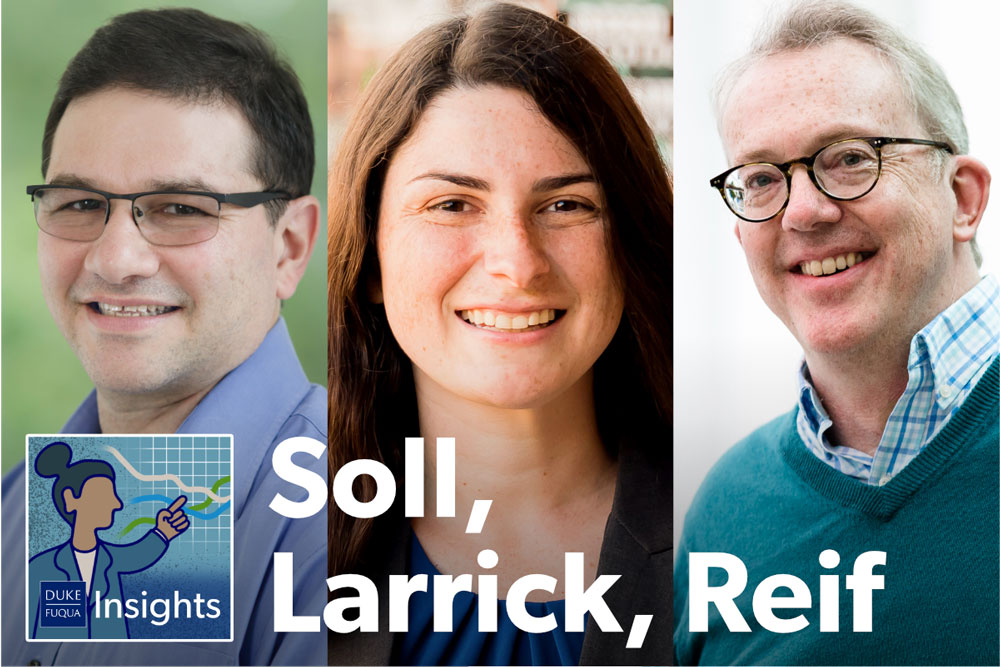Fuqua Insights Podcast: Should You Tell Your Colleagues You Use AI?
Fuqua Insights Podcast: Should You Tell Your Colleagues You Use AI?
Professors Jack Soll, Richard Larrick, and PhD candidate Jessica Reif explore how employees who disclose their AI use face subtle social penalties, even when it improves their performance.
Before you mention that AI tool that's been helping you at work, consider how your colleagues might respond. In this podcast, Professors Richard Larrick and Jack Soll, along with PhD candidate Jessica Reif from Duke University’s Fuqua School of Business, discuss their research into how artificial intelligence tools are reshaping workplace dynamics. Their findings highlight a key paradox: while generative AI can boost performance, using it often makes workers appear less competent, less diligent, and even lazier in the eyes of others.
Drawing on a series of experiments, the researchers show that people who use AI for work are judged more harshly than those who seek help from a colleague or even use other software tools. This “social evaluation penalty” can lead to lower hiring prospects, negative perceptions of job fit, and cause employees to hide their AI use altogether.
But the penalty isn’t universal. The bias disappears when evaluators are frequent AI users. And when a task clearly benefits from AI (e.g., writing or coding), users face fewer reputational risks. The research also reveals that this judgment bias persists across gender, age, and job types — suggesting its effects are widespread.
The research offers insights for both managers and MBA students: creating a culture that normalizes and openly discusses AI use may be critical to unlocking its benefits. Managers must lead by example, openly using generative AI tools to signal that their organization is a safe space for AI innovation and experimentation.
Bios
Richard Larrick is the Hanes Corporation Foundation Professor of Business Administration, Associate Dean for Diversity, Equity & Inclusion, and Professor of Management & Organizations at Duke University’s Fuqua School of Business. An APS Fellow and former president of the Society for Judgment and Decision Making (2017), Larrick earned Fuqua’s Bank of America Outstanding Faculty Award in 2016. He also directs Fuqua’s Center for Energy, Development & the Global Environment (EDGE) and is a Columbia-affiliated faculty in environmental decision-making.
Larrick’s research—published in Science, PNAS, Psychological Review, Management Science, and more—examines judgment and decision-making in areas like energy, environmental choice, debiasing, and wisdom-of-crowds. His 2008 Science paper (with Jack Soll) introduced the “gallons-per-mile” metric, influencing fuel-efficiency labeling in the US. He teaches core MBA leadership courses and executive seminars on leadership, ethics, negotiation, and critical thinking.
Jack Soll, the Gregory Mario & Jeremy Mario Distinguished Professor of Management & Organizations at Fuqua, specializes in judgment and decision-making psychology. He earned his Ph.D. from the University of Chicago and previously served on faculty at INSEAD, with visiting appointments at Chicago and Wharton.
Soll’s research has appeared in Science, Management Science, Journal of Experimental Psychology, and Organizational Behavior and Human Decision Processes, with topical work on overconfidence, group judgment, and public policy implications of behavioral decision research. A noted collaborator, he co-authored the influential 2008 Science article introducing the gallons-per-mile measurement. Soll teaches extensively across MBA and Executive Education programs, tackling decision-making, leadership, negotiation, and statistics.
Jessica Reif is a PhD candidate in Management & Organizations at Duke’s Fuqua School of Business. Her research explores decision dynamics, advice-seeking biases, and AI perceptions. She has collaborated with Professors Larrick and Soll on multiple studies, including research on how "anchoring" in advice-seeking can undermine independent judgment and the study on AI workplace perceptions featured in this podcast.
This story may not be republished without permission from Duke University’s Fuqua School of Business. Please contact media-relations@fuqua.duke.edu for additional information.

